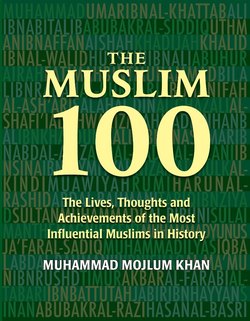Читать книгу The Muslim 100 - Muhammad Mojlum Khan - Страница 32
На сайте Литреса книга снята с продажи.
Оглавление‘BACK TO THE Qur’an and sunnah’ is a famous slogan which has been used by Muslim scholars and reformers throughout Islamic history to summon wayward Muslim rulers and the masses back to the original, pristine Islam as promulgated by the Prophet Muhammad. The call, more often than not, worked due to the Muslim belief that the Qur’an is God’s final communication to mankind, while the normative practice (sunnah) of the Prophet provides a powerful and pertinent commentary on the Divine revelation. In other words, these two sources combined to provide a potent methodology for living a truly Islamic life. For this reason, Muslim scholars and reformers have been able to repeatedly utilise this slogan with much success throughout Islamic history. Shaykh al-Islam Ibn Taymiyyah was one such extraordinary scholar and reformer whose religious ideas and thoughts have continued to exert a powerful influence on Muslim scholars and reformers up to the present day.
Taqi al-Din Abul Abbas Ahmad ibn Abd al-Halim ibn Taymiyyah was born in Harran, a city located on the outskirts of Damascus, into a distinguished family of writers, scholars and theologians. His father, Abd al-Halim, and grandfather, Majd al-Din, were acclaimed hanbali fuqaha (jurists) who had authored numerous books on Islamic jurisprudence (fiqh) and hadith (Prophetic traditions). Brought up in an intellectually friendly environment, Ibn Taymiyyah memorised the entire Qur’an and received training in Arabic language, grammar, hadith and aspects of fiqh (Islamic jurisprudence) under the guidance of his learned father. When he was barely seven, his entire family was forced to flee from Harran in the face of an imminent threat of a Mongol onslaught on the city. The Mongol hordes stormed out of Asia like a thunderbolt from the heavens, and inflicted a crushing blow on the Muslim world by invading Baghdad, the seat of the Abbasid Caliphate, and destroying everything before them with unspeakable brutality; at the time the entire Muslim world was gripped by fear and trepidation. Although the Mongol invasion of Baghdad represented one of the most destructive periods in Islamic history, it was the valiant Egyptian Mamluk soldiers who finally stopped them in 1260 at the Battle of ayn jalut (or the ‘Spring of Goliath’). The Mamluk victory at ayn jalut saved Egypt, Arabia and the neighbouring Islamic lands from Mongol invasion and pillage. Despite suffering a crushing defeat at ayn jalut, the Mongols remained a serious threat.
Not prepared to take the risk, Ibn Taymiyyah’s family moved to the safety of Damascus, which was then controlled by the victorious Mamluks. In Damascus, Ibn Taymiyyah’s family received a warm welcome from the locals as well as the city’s governor. On account of his scholarly and literary accomplishments, his father was appointed principal of a local Islamic seminary (dar al-uloom), where he delivered regular lectures on traditional Islamic sciences. When his name and fame began to spread across Damascus, he was invited to deliver regular sermons (kutbah) at the city’s historic Umayyad mosque. Like his father and grandfather, young Ibn Taymiyyah was an exceptionally bright student who was blessed with a sharp intellect and retentive memory. Not surprisingly, he committed vast quantities of information (including the whole Qur’an, large collections of hadith, juristic rulings (fatawa), poetry and books on philosophy and logic) to memory with ease. His remarkable retentive power aside, Ibn Taymiyyah was a wide-ranging reader who studied books on Qur’anic exegesis (tafsir), theology (kalam), Islamic jurisprudence and philosophy quicker than an average person could eat their dinner. His thirst for knowledge was such that he claimed to have studied under no fewer than two hundred eminent Islamic scholars of his day, including Shaykh Ahmad ibn Abu al-Khair, Yahya ibn al-Sairafi, Ibn Abu al-Yusr and Shams al-Din al-Maqdisi, who was the Chief Justice of Damascus. Along with his father, Abd al-Halim, and uncle, Fakhr al-Din, these were some of the most reputed scholars of tafsir, hadith and fiqh in Damascus at the time. He sat at the feet of these luminaries and thoroughly mastered traditional Islamic sciences. So much so that Shams al-Din, the Chief Justice, considered Ibn Taymiyyah to be competent enough to issue juristic rulings (fatawa) when he was barely seventeen years old.
